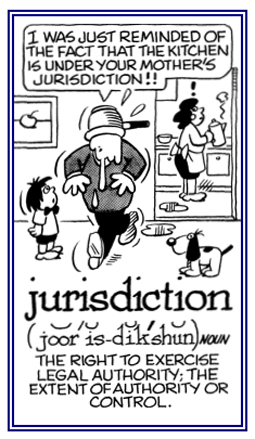alternate juror
(s) (noun), alternate jurors
(pl)
An additional person or people who are impanelled in case of a sickness or a disability of any members of a jury: Alternate jurors are usually available for trials of expectedly long durations .
corpus iuris
(juris) (pl) (noun)
Body of law or a compilation of laws; or the assembled laws, of a nation, state, etc.: The collected laws of a nation, state, or city are its
corpus iuris.
Church law is corpus iuris canonici while civil law is corpus iuris civilis.
jurisconsult
(s) (noun), jurisconsults
(pl)
1. A person who is an expert in juridical science: The judge is a jurisconsult who has a thorough knowledge of civil law and international law.
2. Etymology: from Latin jurisconsultus, "one who is skilled in the law, a lawyer" from juris, "right, law" + consultus, "skilled".
jurisconsultus
(s) (noun), jurisconsulti
(pl)
In Roman law, an expert in legal science or someone who was an expert regarding the laws: The Roman jurisconsulti were regularly consulted for legal information and advice, both by private citizens; such as, their clients, and also by the magistrates (government officials), advocates, and others who were responsible for administering justice.
jurisdiction
(s) (noun), jurisdictions
(pl)
1. An area or the extent or range in which legal authority or power is exercised: The courts have
jurisdiction not only over their own legal citizens, but also over foreigners who are living in their country as well.
Jurisdiction is an exercise of judicial authority, or of the functions of a judge or legal tribunal, having the power of declaring and administering law or justice and who have legal authority or power.
2. Etymology: from Old French jurediction; from Latin jurisdictio(n); from jus, jur, "law" + dictio "saying"; from dicere, "to say".
 © ALL rights are reserved.
© ALL rights are reserved.
Go to this Word A Day Revisited Index
so you can see more of Mickey Bach's cartoons.
jurisdictional amount
(s) (noun), jurisdictional amounts
(pl)
The required quantity of evidence or that is involved in a particular case to give to a court: The jurisdictional amount of a trial court is commonly limited by the totality of controversy that is involved in a specific legal action.
jurisdictive
(adjective), more jurisdictive, most jurisdictive
Referring to the right, power, or authority to administer justice by hearing and determining controversies: "The jurisdictive authority of the municipal courts applied not only to traffic violations, but also to more serious crimes."
jurisinceptor
(s) (noun), jurisinceptors
(pl)
A student of civil law.
jurisprudence
(s) (noun), jurisprudences
(pl)
1. The philosophy or science of law, the legal system, and the principles that lead courts to make the decisions that they do: Some forms of jurisprudence include specific departments or divisions of law.
2. A particular system or body of laws imposed by authorities.
3. Etymology: "knowledge of law" from Latin jurisprudentia, "the science of law"; from juris, "of right, of law" + prudentia, "knowledge, a foreseeing, foresight, sagacity, wisdom" as applied in this term.
jurisprudent
(adjective), more jurisprudent, most jurisprudent
A reference to someone who has an expert legal knowledge of the principles of law.
jurisprudential
(adjective), more jurisprudential, most jurisprudential
Pertaining to the science or philosophy of law or a system of laws.
jurist
(s) (JOOR ist) (noun), jurists
(pl)
A judge or lawyer who is an expert in a specific legal field: Judge Lawrence was described by his colleagues as an eminent
jurist in the area of commercial law.
Jurists are usually people who have distinguished themselves by writing about legal subjects or to judges.
Martin Roy was described by his colleagues as an eminent jurist in the area of legal processes.
juristic
(adjective), more juristic, most juristic
Characteristic of someone who has achieved recognition in the legal profession.
juror
(s) (JOOR uhr, JOOR or") (noun), jurors
(pl)
Members of a body of people who have sworn to give a legal verdict based on the evidence on a given matter presented in a court of law: Yesterday, Mrs. Black was selected to be a
juror at the trial of the person who had committed fraud.
In a surprise turn of events, the eminent civil law professional was selected as a juror for the upcoming conflict-of-interest trial.
Yesterday, Allen was selected to be a juror at the trial of the person who had committed fraud.


